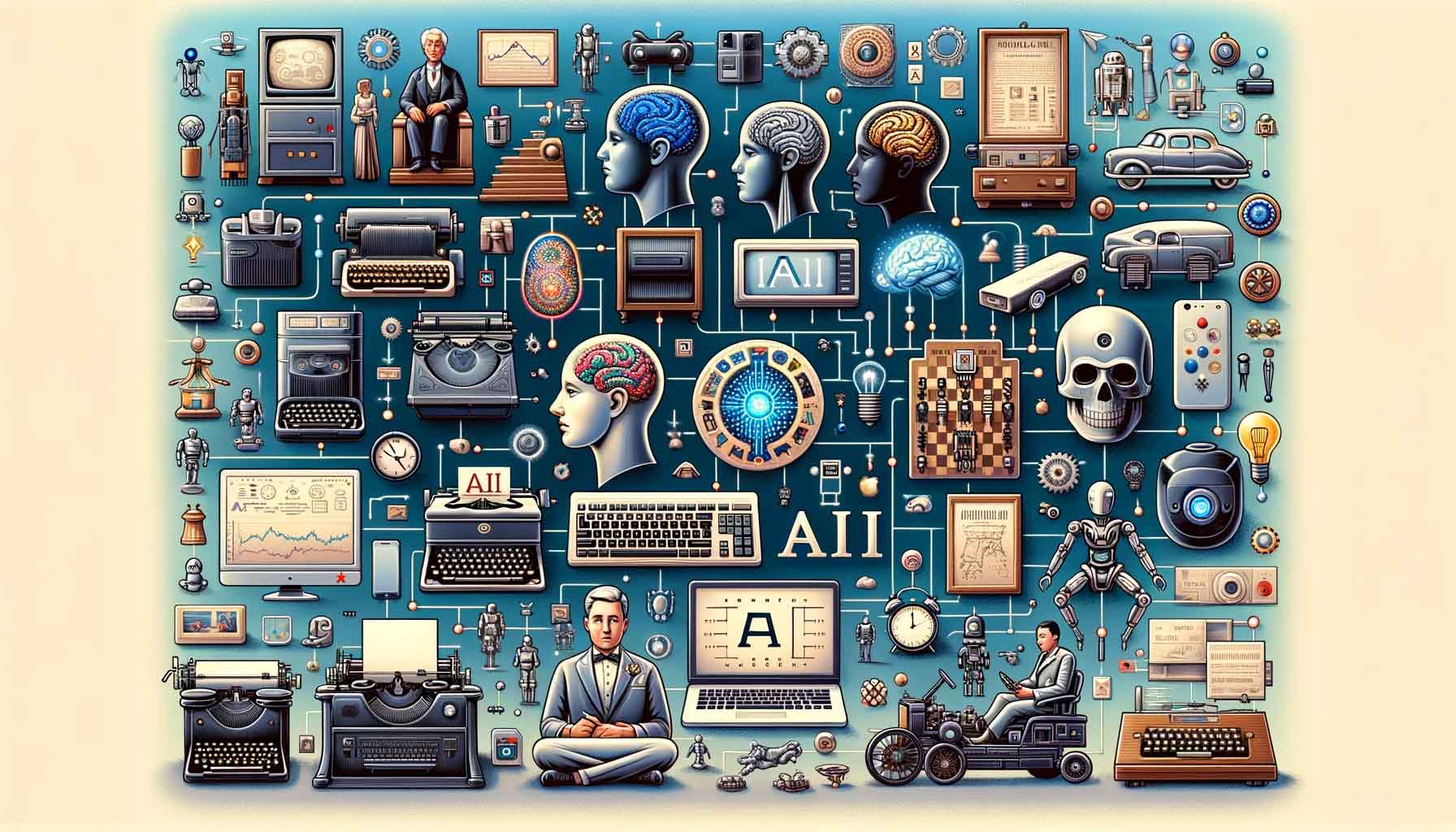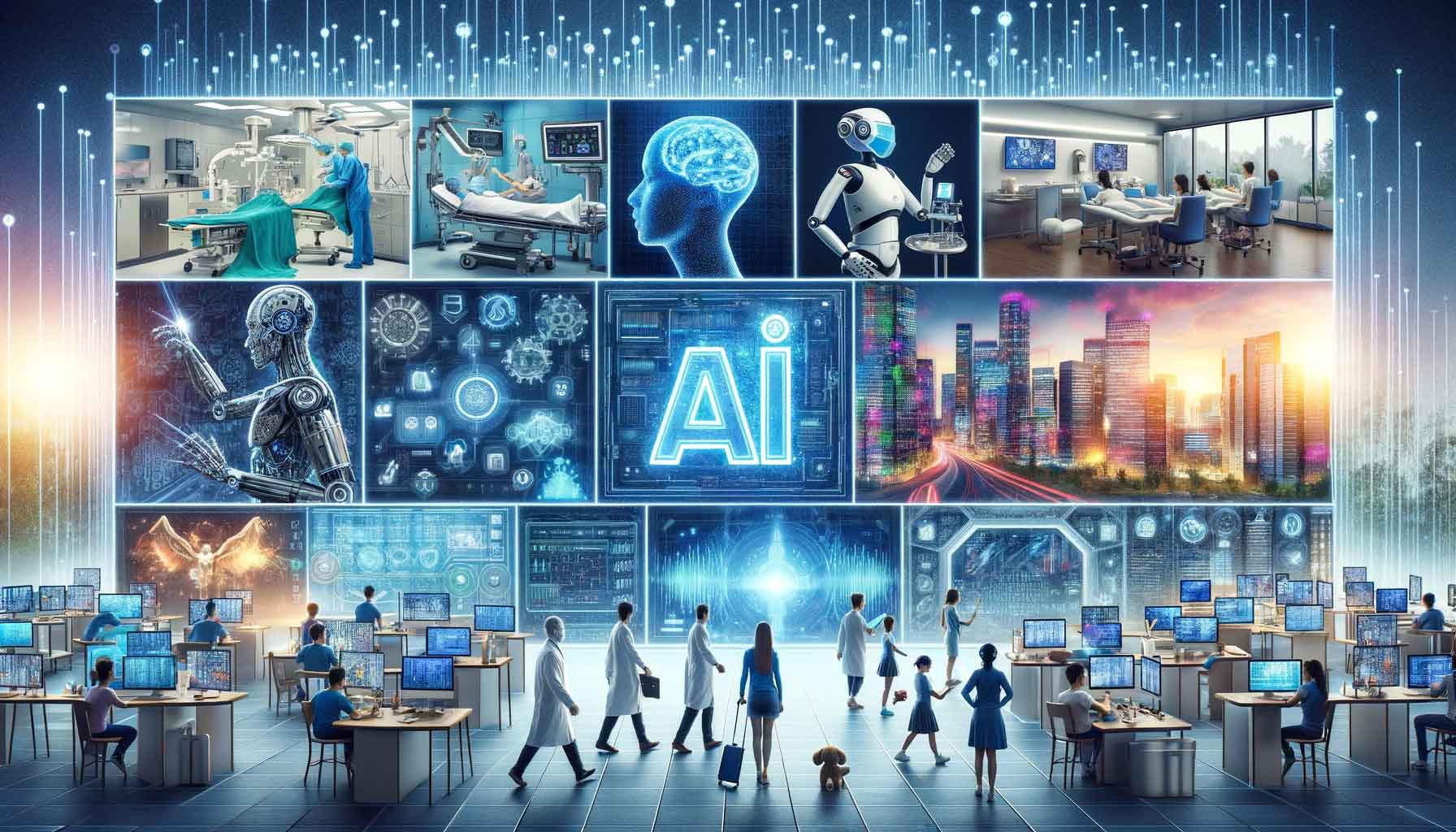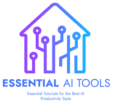Exploring The History of AI: A Historical Perspective, Tracing Its Development

Artificial intelligence, or AI, has come a long way since its inception. AI technology has transformed the way we live and work, and it has become an integral part of everyday life. In this section, we will delve into the history of AI and offer a historical perspective, tracing its development from its origins to present day.
We will explore the early ideas and concepts that laid the foundation for the development of AI. From early computing machines to breakthroughs in machine learning and neural networks, we will highlight the key milestones in AI development. We will also examine the impact of AI on various industries and the collaboration between humans and AI systems.
Key Takeaways:
- AI technology has revolutionized various industries and has become an integral part of everyday life.
- The development of AI can be traced back to early computing machines and breakthroughs in machine learning and neural networks.
- The relationship between humans and AI systems is constantly evolving, and collaboration is essential.
- AI technology holds immense potential, and it is important to continue exploring the possibilities while addressing the ethical considerations.
Click here to check out the most Productive AI Tools
The Origins of Artificial Intelligence
Artificial Intelligence has come into existence through a combination of ideas and concepts that have been fostered since the Ancient times. Theoretical work on logic, reasoning, and computation can be traced back to the Greek philosophers and continues throughout history.
However, the concept of AI emerged in the mid-1900s when computer science and technology advanced significantly. The term “artificial intelligence” was coined by John McCarthy in 1956, marking the beginning of the AI era.
The Early Ideas that Shaped AI
One of the earliest concepts that laid the foundation of AI was the invention of the programmable digital computer by Alan Turing in 1936. Turing proposed that a machine could be designed to simulate any human’s thought process by following a set of instructions, known as an algorithm. This concept formed the basis for modern computing and artificial intelligence.
The development of the electronic digital computer by John Atanasoff and Clifford Berry in 1942 was another key milestone. Their invention introduced the notion of binary digits (bits) and provided the computational power necessary for future AI development.
The Birth of AI: Dartmouth Conference
The birth of AI is often attributed to the Dartmouth Conference organized by John McCarthy, Marvin Minsky, Claude Shannon, and Nathaniel Rochester in 1956. The conference was a two-month brainstorming session that brought together experts in computer science, mathematics, and other related fields to discuss the potential of AI.
The conference marked the beginning of AI research and development and inspired numerous researchers to explore the creation of artificial intelligence.
The Rise of Machine Learning and Neural Networks
In the 1980s, machine learning became a crucial field of AI research. The development of algorithms that enabled machines to learn from data revolutionized AI, making it more accessible and practical. Machine learning is now widely used in various applications, such as image recognition, natural language processing, and recommendation systems.
Neural networks are another significant development in AI. Modeled after the structure of the human brain, neural networks are designed to recognize patterns and make decisions based on them. Deep learning, a subset of neural networks, is widely used in image and speech recognition, natural language processing, and other applications.
The evolution of AI has been a journey filled with innovation, experimentation, and groundbreaking advancements. As AI continues to advance, the possibilities for its application are endless.
Technological Advancements in AI
The development of AI has been a result of significant technological advancements. As we explore the evolution of AI, it is crucial to discuss the breakthroughs that have propelled it forward. From early computing machines to advanced machine learning technologies, the progress has been impressive.
The following are some of the remarkable AI technological advancements:
| Advancement | Description |
|---|---|
| Natural Language Processing | It is a subfield of AI that allows computers to understand human language and communicate effectively. |
| Machine Learning | It is a technology that enables AI systems to automatically learn and improve from experience without being explicitly programmed. |
| Neural Networks | They are a set of algorithms that mimic the functioning of the human brain by recognizing patterns and learning from data. |
| Computer Vision | It is a technology that enables machines to interpret and understand visual information from the world. |
For example check out MagicStudio to edit photos in seconds
These advancements have led to the creation of intelligent systems that can perform complex tasks autonomously. The applications of AI are endless, and their potential is enormous.
As the field of AI continues to progress, we can expect even more advanced systems in the future. The possibilities are exciting, but it is essential to consider the ethical implications of AI development to ensure that it benefits society as a whole.
AI’s Evolution: A Historical Timeline
Artificial intelligence has come a long way since its inception. Here, we present a historical timeline of AI, highlighting significant moments and breakthroughs throughout its development.
| Year | Event |
|---|---|
| 1943 | The first neural network, the McCulloch-Pitts neuron, is proposed. |
| 1950 | Alan Turing proposes the ‘Turing Test,’ a measure of a machine’s ability to exhibit intelligent behavior equivalent to that of a human. |
| 1956 | The term ‘Artificial Intelligence’ is coined, and the field is born. |
| 1959 | Arthur Samuel develops the first machine learning program, a checkers-playing AI system. |
| 1966 | The ‘Eliza’ program is developed, a natural language processing tool that simulates conversation by using pattern matching and substitution methodology. |
| 1979 | First AI-generated theorem is proven. |
| 1997 | IBM’s Deep Blue computer beats the world chess champion, Garry Kasparov, in a six-game match. |
| 2011 | IBM’s Watson computer defeats two all-time champions in Jeopardy. |
| 2015 | Google’s AlphaGo defeats the world champion in the notoriously difficult Chinese game of Go. |
| 2018 | OpenAI creates an AI system, GPT-2, that can produce coherent and realistic text. |
| 2020 | OpenAI has launched GPT-3, an advanced language model that employs deep learning techniques to generate various types of computer code. |
| 2022 | ChatGPT, an AI chatbot developed by OpenAI, debuts in November 2022 & and is accessible to everyone for the first time! |
| 2023 | The GPT-4 model, developed by OpenAI, was launched in March 2023. It is seen as a significant advancement compared to its predecessor, GPT-3.5. In November |
As we can see from this brief timeline, AI has had a rich and varied history, with significant breakthroughs occurring regularly throughout the years. As we look to the future, it is clear that AI has the potential to transform our world in countless ways, making our lives easier, more efficient, and more enjoyable.
AI in Popular Culture
Artificial intelligence has intrigued and captivated people worldwide, and it is no surprise that AI has been frequently featured in popular culture. From books to movies, AI has been portrayed in many ways, ranging from helpful and friendly to dangerous and malevolent.
In books, AI has been featured in numerous science fiction novels, such as Isaac Asimov’s “I, Robot,” which portrays AI as helpful and beneficial to society, and “The Terminator,” which presents an AI-powered robot as a threat to humanity. Several other books like “Do Androids Dream of Electric Sheep?” and “The Diamond Age” explore the complexities of human and AI relationships.
“I’m sorry, Dave. I’m afraid I can’t do that.” -HAL 9000, in “2001: A Space Odyssey”
In movies, AI has been depicted in various ways, from the adorable robot BB-8 in “Star Wars: The Force Awakens” to the eerie HAL 9000 in “2001: A Space Odyssey.” Other notable mentions include the cyborgs in “The Matrix,” the human-like robots in “Blade Runner,” and the machines in “Terminator.” And every year, more and more of these films are released.
| Movies and TV Shows with AI | Description |
|---|---|
| The Terminator | The story follows a cyborg assassin, played by Arnold Schwarzenegger, sent back in time to kill a woman whose son will lead a resistance movement against machines. |
| Ex Machina | A billionaire invites a programmer to his remote estate to administer the Turing test to a humanoid robot with AI. |
| Black Mirror | A popular TV show that explores a dark and twisted future with advanced technologies, including AI. |
| Mission: Impossible – Dead Reckoning Part One | Ethan Hunt (Tom Cruise) and his IMF team are on a critical mission to locate a dangerous AI weapon that threatens humanity, aiming to secure it before it falls into the wrong hands. |
In music, AI has also made its way into the industry, with AI-generated music created by various software and tools, such as Amper Music, Jukedeck, Mubert and AIVA. These tools use algorithms and machine learning to generate original music pieces, and while they are still in their early stages, they showcase the potential of AI in creative fields.
The portrayal of AI in popular culture has a significant impact on public perception and the development of AI technology. These portrayals reflect society’s fascination and fear of AI, driving both research and innovation in the field. It is essential to appreciate the nuances of these representations, keeping in mind the ethical concerns and limitations of AI technology.
Ethical Considerations in AI Development
As AI continues to grow and advance, ethical considerations must be taken into account. The development of AI has brought up numerous ethical dilemmas and challenges that must be addressed in order to ensure the responsible and safe integration of AI technology into society.
One ethical consideration in AI development is the issue of privacy. As AI systems collect and process vast amounts of data, there is a risk that individuals’ privacy rights may be compromised. It is important to establish clear guidelines and regulations regarding the use and protection of personal data in AI systems.
Another ethical consideration is the potential for AI to perpetuate bias and discrimination. AI systems are only as unbiased as the data they are trained on, and historical data can often contain implicit biases. It is crucial to ensure that AI systems are developed and trained using diverse data sets and that they do not perpetuate or reinforce discriminatory practices.
“AI developers and researchers must acknowledge ethical considerations and engage in open, transparent conversations with the public about potential risks and benefits of AI technology.”
Additionally, the impact of AI on employment is an ethical consideration that must be addressed. As AI technology replaces certain jobs, there is a risk of job displacement and economic inequality. It is important to explore ways in which AI can be used to augment human capabilities and create new job opportunities.
Overall, AI developers and researchers must acknowledge ethical considerations and engage in open, transparent conversations with the public about potential risks and benefits of AI technology. By addressing these ethical considerations, we can ensure that AI technology is developed and used in a responsible and beneficial manner.
AI’s Impact on Industries

Artificial intelligence has dramatically transformed various industries, streamlining processes, and improving efficiencies. From healthcare to finance, transportation to customer service, AI technologies are reshaping the way we work and interact. Take a closer look at how AI is making a difference in different sectors here.
The Future of AI: Advancements and Possibilities
The progression of AI throughout history has been remarkable, and the future looks even brighter. Technological advancements in AI are accelerating at an unprecedented pace, and the potential for AI to transform our world is immense.
One area that holds great promise is robotics. Advances in robotics technology have enabled the development of sophisticated machines that can perform complex tasks with precision and efficiency. From humanoid robots to drones, the possibilities for robotics are endless.
The Possibilities of Robotics
The potential applications of robotics are vast and varied. In healthcare, robots could be used to perform surgeries with greater accuracy and control, reducing the risk of human error. In manufacturing, robots are already being used to assemble products more quickly and efficiently than humans. In agriculture, robots could be used to automate tasks such as planting and harvesting crops, improving efficiency and reducing labor costs.
Robots are also being developed for use in hazardous environments, such as deep-sea exploration or space exploration. These robots can perform tasks that are too dangerous for humans, such as inspecting oil rigs or exploring other planets.
The Promise of AI-Powered Systems
AI-powered systems are also transforming various sectors, with the potential to revolutionize the way we live and work. In transportation, autonomous vehicles are being developed that can improve safety and efficiency on the roads. In finance, AI-powered systems are being used to predict market trends and make investment decisions. In education, AI-powered tutoring systems could provide personalized learning experiences for students.
AI-powered systems also have the potential to transform healthcare. With the ability to analyze vast amounts of medical data, AI-powered systems can help doctors and researchers identify new treatments and make better diagnoses.
Challenges Ahead
Despite the immense potential of AI, there are also challenges ahead. Ethical concerns such as privacy and bias must be addressed to ensure that AI is developed and used responsibly. The potential impact of AI on employment is also a concern, as automation could lead to job displacement in certain sectors.
As we move forward with the development of AI, it is essential that we address these challenges while continuing to explore the possibilities that AI holds. With the right approach, AI has the potential to transform our world and improve human lives in ways that we cannot yet imagine.
AI and Human Collaboration
As artificial intelligence continues to advance, the role of humans in collaborating with these systems becomes increasingly important. AI has the potential to augment human capabilities, leading to improved problem-solving and decision-making.
One area where human collaboration with AI is particularly effective is in healthcare. AI-powered systems can assist doctors in diagnosing illnesses, analyzing medical images, and even predicting the likelihood of future health issues. By working together with AI, healthcare professionals can provide more accurate diagnoses and deliver better patient care.
AI and Human Learning
Another way in which humans can collaborate with AI is through learning. AI-powered software can provide personalized learning experiences and real-time feedback to help students improve their understanding of complex concepts. Additionally, AI can assist teachers in identifying areas where students may be struggling, allowing them to provide targeted support to each individual.
The Importance of Human Oversight
While AI can assist in numerous ways, it is crucial that humans maintain oversight and control over these systems. Ethical considerations must be taken into account to ensure that AI is being used to benefit society and not harm it. This requires collaboration between experts in AI, ethics, and other relevant fields to establish guidelines and regulations for the development and implementation of AI.
The Future of Collaborative AI
As AI technology continues to evolve, the possibilities for collaboration between humans and AI are endless. From improving healthcare and education to revolutionizing industries and solving complex global problems, the potential for AI-human collaboration is immense. By working together, we can harness the power of AI to create a better future for all.
Conclusion

In conclusion, the evolution of artificial intelligence has been a fascinating journey. By exploring its history and providing a historical perspective, we have gained insights into how AI has developed over time. From its early beginnings to contemporary advancements, we have witnessed significant milestones in AI development.
The future of AI holds immense potential, and it is essential that we continue to explore its possibilities while addressing the ethical considerations that come with it. The integration of AI into our lives requires a harmonious collaboration between humans and machines, and we must remain mindful of its impact on society and industries.
By keeping an ai historical perspective, we can also appreciate the role that popular culture has played in shaping public perception and the advancement of AI technology. As we progress towards the future, it is crucial that we continue to work towards a responsible and collaborative approach to AI development.
Evolution of Artificial Intelligence
As we have seen, the evolution of artificial intelligence has been a gradual progression. From early concepts to contemporary applications, AI has come a long way. With the promise of exciting advancements and possibilities, it is an exciting time to be exploring the world of AI.
By keeping an ai historical perspective, we can appreciate the significance of the breakthroughs and milestones that have led to the development of AI as we know it today. It is a testament to human ingenuity and innovation, and we can look forward to an exciting future of collaboration and progress between humans and machines.
FAQ
What is the history of AI?
The history of AI dates back to the 1950s when researchers began exploring the possibility of creating intelligent machines. Over the years, AI has evolved through various stages, with significant milestones and breakthroughs shaping its development.
Where did artificial intelligence originate?
Artificial intelligence originated from the efforts of early computer scientists and mathematicians who sought to develop machines that could mimic human intelligence. The field gained momentum with the works of figures like Alan Turing and John McCarthy.
What are some key technological advancements in AI?
AI has seen numerous technological advancements over the years. Some notable milestones include the development of expert systems, neural networks, and machine learning algorithms. These advancements have significantly improved the capabilities of AI systems.
Can you provide a timeline of AI’s historical evolution?
Certainly! AI’s historical timeline starts in the 1950s with the birth of AI as a field of study. It then progresses through various stages, including the summer of AI research in 1956, the rise of expert systems in the 1970s, and the emergence of machine learning and neural networks in the 1980s and beyond.
How has AI been portrayed in popular culture?
AI has been a captivating topic in popular culture, often depicted in movies, books, and other forms of media. From the friendly AI in movies like Wall-E to the menacing AI in films like The Terminator, popular culture has explored various portrayals of AI, influencing public perception.
What ethical considerations are involved in AI development?
AI development raises several ethical considerations. These include issues like privacy, bias in AI algorithms, and the potential impact of AI on employment. It is important to address these concerns to ensure the responsible and ethical development and deployment of AI systems.
How has AI impacted different industries?
AI has had a transformative impact on various industries. In healthcare, AI is being used for medical diagnosis and personalized treatment plans. In finance, AI is employed for fraud detection and portfolio management. Transportation has also been revolutionized by AI, with the advent of autonomous vehicles.
What does the future hold for AI?
The future of AI is full of possibilities. Advancements in robotics, natural language processing, and machine learning continue to shape the field. AI has the potential to revolutionize industries further, enhance human capabilities, and address complex problems in innovative ways.
How can humans collaborate with AI systems?
Collaboration between humans and AI systems is essential for harnessing the full potential of AI. Humans can work alongside AI to leverage their complementary strengths. AI can assist in data analysis, decision-making, and automating routine tasks, while humans provide creative thinking, emotional intelligence, and ethical judgement.


